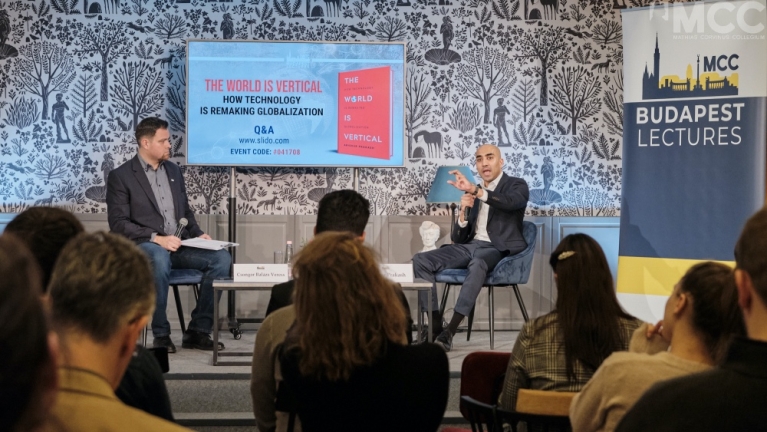The first months of 2022 were busy ones for those following the development of cancel culture in the United States. Two incredibly different, but relatively well-known figures, Ilya Shapiro and Whoopi Goldberg, faced immense pressure over recent remarks. Shapiro, a well-known Libertarian scholar, came under attack when he criticized President Biden’s announcement that he would exclusively select a black woman for the Supreme Court. Shapiro lambasted this decision as he believed the exclusion of non-black and male candidates would lead to a lesser-qualified black woman being selected. The uproar over his supposedly racist comment resulted in his temporary suspension as executive director of the Georgetown Center for the Constitution.
Similarly, media personality Whoopi Goldberg was briefly suspended from her position as host of The View due to ignorantly asserting that the Holocaust was not about race, but “between white people,” and thus not her concern. Unlike Shapiro, Goldberg is a strong figure on the left and routinely attacks conservatives.
In response to this trend, cancel culture is now being met with widespread and growing opposition. Although the fight over cancel culture is often portrayed as right vs. left, with the left supporting it and the right against it, there is a growing bipartisan opposition to cancel culture.
Bill Maher, once America’s premier leftist, has now become a fierce critic of cancel culture. He regularly uses his program to critique fellow leftists for their embracement of cancel culture. Most recently he defended Goldberg from being removed saying she “should not be canceled or put off her show, as much as I totally disagree with her crazy statement.”
Likewise, many notable leftists and centrist philosophers and activists, such as Noam Chomsky, Francis Fukuyama, and Gloria Steinem, signed their names to a letter criticizing cancel culture that was published in Harper’s Magazine last year.
While this bipartisan coalition is a useful tool to help fight the unjust invalidating of individuals over minor, misplaced, offensive, or just stupid incidents, it also poses a potential threat. Namely, that it will, along with erasing cancel culture, once again erase the right of communities to maintain a standard of public decency.
What if, for example, Whoopi Goldberg had said the Holocaust never happened? Or Ilya Shapiro said that black women were, by biological determination, inferior?
The reason that our current cancel culture is a threat, is not because it holds people accountable for what they say, but rather because it targets individuals who said something ignorant, like Goldberg, or because they stated a politically incorrect view as in Shapiro’s remarks. It is the values behind cancel culture which make this phenomenon a problem, not the actual act itself.
We cannot allow our pushback against cancel culture to devolve into an anarchic perception of free speech, which rejects any attempt for people to be held responsible for their actions. Free speech must always be understood to have well-defined limits.
This unlimited approach to free speech, after all, was the leading leftist ideology before their development of cancel culture and is why many older liberals dislike cancel culture. While it might be tempting to want to return to this, this free speech movement was just as destructive as cancel culture to social morality and cohesion.
Throughout the late 20th and early 21st century, appeals to ‘Freedom of Speech’ were used to systematically break down and destroy communal senses of morality and decency. In 1978, for example, on the grounds of free speech, Neo-Nazis were allowed to march through a predominantly Jewish community of Skokie, Illinois. The Neo-Nazis were barred by local authorities from marching for the clear reason that it would be reprehensible act to allow, but the Neo-Nazis appealed to the U. S. Supreme Court which ruled in a 5-4 judgement in favor of the National Socialists. On the altar of absolute free speech, Nazis were de facto given permission to torment and traumatize an entire community.
Similarly, any government censorship based on public morality was systematically dismantled by advocates and judges who desired unlimited free speech. Decade after decade censorship and restriction of pornography, obscenity, and other indecent material was progressively struck down due to ‘violation’ of free speech. This was a radical reimagination of free speech, from the original notion of the freedom to speak within community standards, to the freedom to provoke, denigrate, and insult communal values.
I experienced the excesses of this interpretation of free speech firsthand in my hometown of Leesburg, Virginia. Several years ago, local atheists became upset that our courthouse displayed a nativity scene sponsored by the local Catholic Church. The county board of supervisors decided, based on ‘free speech’, to allow them to display a sign which attacked and denigrated the neighboring nativity scene. The farce only grew, with several groups appealing to have their own sign. The spectacle finally resulted in a myriad of signs and most incredulously a crucified skeleton in a Santa Claus outfit being placed in front of our town’s courthouse.
The concept of total and unregulated free speech is just as antithetical to the Western tradition as cancel culture, and it should not be what we fight to return to. Europe has never embraced this approach and routinely censures the right of Neo-Nazis and other radicals from spreading their violent ideologies. Hungary, for example, forbids the trivialization of both fascists and communist crimes of the last century.
Even the United States, which strongly enshrined the freedom of expression in the First Amendment, heavily regulated speech before the late 20th century. Almost every state had strict censorship and public decency laws. Maryland, for example, had several blasphemy laws since the 1700s which were only declared ‘unconstitutional’ by Maryland’s supreme court in 1972. Precedence exists on the federal level as well; the 1873 Comstock Act forbid the USPS from distributing any “obscene, lewd, or lascivious, and every filthy book, pamphlet, picture, paper, letter, writing, print, or other publication of an indecent character.” Even today, only the most radical proponents of absolute free speech would advocate that it be extended to child pornography, incitement of violence, or libel.
None of this is a direct appeal to return to any specific law, but rather that returning to ‘normal’ from cancel culture does not mean returning to unrestricted free speech. To do so would be to enable socially, morally, and culturally destructive forces, such as cancel culture, to fester and destroy society. Had the ideologies behind our current cancel culture crisis been regulated in the past decades and not allowed to spread freely throughout our institutions, we would not have to deal with it today.
We must not repeat the mistakes of the past in our fight against cancel culture. Instead of returning to another equally flawed approach to free speech, we must change how we regulate speech and replace the morally bankrupt values which dominate today with the traditional values which governed our civilization for the past two millennia. A healthy society will always regulate its speech when a community knows what is being said is wrong or destructive to public decency. Those fighting against cancel culture must never forget this fundamental truth.









